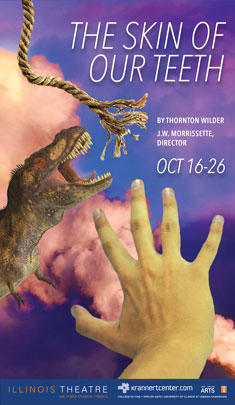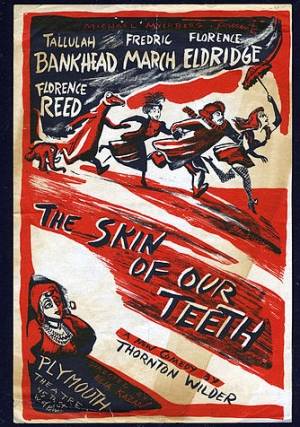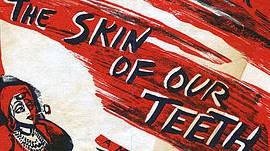 Beginning October 16th, Krannert Center for the Performing will host a run of one of the most remarkable plays of the twentieth century, Thornton Wilder’s The Skin of Our Teeth. Despite its complexity, it is frequently performed; in fact, in October of 1975, our University’s own Department of Theatre staged a splendid production of this masterpiece. Now, faculty member J. W. Morrissette brings this enigmatic masterpiece back to Krannert’s stage.
Beginning October 16th, Krannert Center for the Performing will host a run of one of the most remarkable plays of the twentieth century, Thornton Wilder’s The Skin of Our Teeth. Despite its complexity, it is frequently performed; in fact, in October of 1975, our University’s own Department of Theatre staged a splendid production of this masterpiece. Now, faculty member J. W. Morrissette brings this enigmatic masterpiece back to Krannert’s stage.
From its very beginning, this play was marked with adjectives from “brilliant” to “incomprehensible.” Taxis hovered around the theaters during its out-of-town try-outs in Boston and New Haven as confused and sometimes hostile audience members left the theater well before the final curtain. The sheer originality of a script that manipulates time, characters, and plot lines was so different, it either thrilled audiences or appalled them.
Plus, the year was 1942: the democracies of the world were threatened with Fascism and fighting for their very survival. The Skin of Our Teeth deals with imminent disasters and constant threats to life as we know it, yet it is written as a comedy. Audiences in 1942 surely wondered (possibly aloud): do we need another reminder of the world situation — and how can it be funny?
It turned out that this was only the beginning of its problems as its Broadway opening approached.
 Tallulah Bankhead (right) would wow audiences as Sabina, the family maid who also narrates part of the story and constantly addresses the audience. Yes, everything here was unconventional, and as brilliant as Ms. Bankhead’s performance was, she quarreled with her producer, gave advice to other actors on their acting, became a bitter enemy of co-star Florence Eldridge, and prompted a series of telegrams to playwright Thornton Wilder, who was in training for his new temporary job as an Army Air Intelligence officer. The show became Bankhead’s show, and audiences and critics accepted the play for its brilliance, Elia Kazan’s superb direction of the cast, and Bankhead’s tour-de-force turn as a force of theatrical mastery.
Tallulah Bankhead (right) would wow audiences as Sabina, the family maid who also narrates part of the story and constantly addresses the audience. Yes, everything here was unconventional, and as brilliant as Ms. Bankhead’s performance was, she quarreled with her producer, gave advice to other actors on their acting, became a bitter enemy of co-star Florence Eldridge, and prompted a series of telegrams to playwright Thornton Wilder, who was in training for his new temporary job as an Army Air Intelligence officer. The show became Bankhead’s show, and audiences and critics accepted the play for its brilliance, Elia Kazan’s superb direction of the cast, and Bankhead’s tour-de-force turn as a force of theatrical mastery.
The price for all this notoriety was high, though, and the controversy did not end.
This extraordinary parable on human survival caught on with New York audiences and press, and all was going smoothly when the prestigious New York Drama Critic’s Award was announced. The critics passed over The Skin of Our Teeth for Sidney Kingsley’s The Patriots, with most of the credit (or blame) for this slight going to famed critic George Jean Nathan, who convinced his colleagues articles in the Saturday Review — damning accounts which claimed that Wilder had borrowed excessively from James Joyce’s Finnegan’s Wake for the basic structure of The Skin of Our Teeth — had merit. Wilder was a well-known literary scholar who had written on Joyce and had certainly been influenced by Joyce’s unconventional use of time and character. But, The Skin of Our Teeth is Thornton Wilder condensing many unconventional concepts into his own idiom and nobody else’s.
 In later years, Wilder would acknowledge the literary influence of Joyce and others on his works, but he was no plagiarist. Fortunately the Pulitzer committee believed in Wilder’s work and not the controversy surrounding it. The Skin of Our Teeth received the Pulitzer Prize for Drama in 1943.
In later years, Wilder would acknowledge the literary influence of Joyce and others on his works, but he was no plagiarist. Fortunately the Pulitzer committee believed in Wilder’s work and not the controversy surrounding it. The Skin of Our Teeth received the Pulitzer Prize for Drama in 1943.
But even that accolade did not save the play from a disastrous national tour. Tallulah Bankhead developed ulcers from her quarrels with producer Michael Myerberg and others, and she refused to do the tour. As previously mentioned, the public had come to believe The Skin of Our Teeth was her play, and in many ways it was. Despite its Pulitzer Prize and near rave New York reviews, it bombed so horribly on the road that the producer took to passing out free tickets just to get bodies in the theater.
So, was there life after Tallulah for The Skin of Our Teeth? In a word, Yes. The years have been kind to this play, and, although no film version was ever made of it, it has been revived away from Broadway many times. Its many virtues have been separated from its early controversies, and audiences have come to appreciate the play’s unique qualities. It is the ultimate parable on human survival; whenever bad times seem to be on the horizon, The Skin of Our Teeth becomes all the more meaningful.
In October of 1975, John Ahart staged a splendid production of The Skin of Our Teeth for Krannert’s Playhouse Theatre. In this wonderful cast were such future show business stalwarts as actors Jodean Culbert and Alan Ruck. Beth Henley, who played Galdys, the daughter, would win the Pulitzer Prize for Drama five years later. But it was the casting of faculty member Roman Tymchyshyn as George Antrobus, the family patriarch, that created the most buzz. It was unusal to cast faculty in crucial parts, much less the male lead, but Tymchyshyn’s performance was a rousing success.
My long-time colleague in theatre coverage in this community, Syd Slobodnik, was a member of the Property Crew for that productions, and he remembers the magic that Roman Tymchyshyn brought to the role:
“Roman, who was my academic advisor, was so impressive in rehearsals. Sure, I was used to peers being on stage, but a teacher was different. From those initial rehearsals to the October performances, Roman’s dynamic performance as Mr. Antrobus was like a Robert Preston with an Eastern European accent let loose on the Krannert stage. His was a Broadway caliber performance.”
Thirty-nine years later, this once controversial — and now classic — play returns to the same Colwell Playhouse under J. W. Morrissette’s direction. A whole new generation of student actors and faculty will restate and reinterpret this amazing piece of theater. A new aberration of theatregoers will be exposed to this extraordinary parable and will, perhaps, understand what makes this play so unique and so continuously meaningful.
Performances of The Skin of Our Teeth will begin on October 16th and run through October 26th on a weekend schedule. For further information go to the KCPA website, or call the Box Office at 217-333-6280.
Coda: I said above that there was no film of the play. There is, however, one DVD of The Skin of Our Teeth. It is a videotaped stage production at San Diego’s Old Globe Theater from 1983. It is part of the Broadway Theater Archives series, although this production did not run on Broadway. It stars Blair Brown as Sabina.








